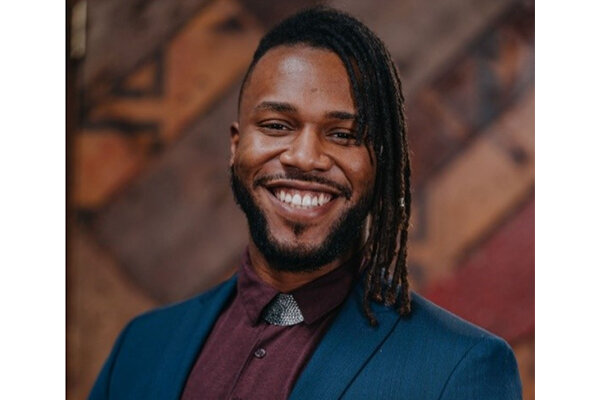Be Proud: Community Organizations are Only as Impactful as the People Who Inform Them
Pride Month: Q&A with Indiana Pride of Color, Inc Board President, TJ Wright
Pride Month, celebrated each June, commemorates the 1969 Stonewall riots and works to highlight the progress towards equality for those in the LGBTQIA+ (Lesbian, Gay, Bisexual, Transgender, Queer, Intersex, and Asexual) community.
For LGBTQIA+ folx, Pride is not just a celebration – it’s a time of reflection for the barriers that the community has overcome and the acknowledgment of challenges its members still face, including discrimination and access to basic needs (food, shelter, quality healthcare), even here in Central Indiana. For example, “Every night, an estimated 72 youth who identify as lesbian, gay, bisexual, transgender, or questioning (LGBTQ) are homeless right here in [Indianapolis]”. Fortunately, there are community organizations and resources across our service area fighting for equity for LGBTQIA+ adults and youths.
Today, Pride Month celebrates the rich diversity within the LGBTQIA+ community, including the various identities regarding race, ethnicity, religion, gender, and ability. This raises the question: how can we increase intersectionality and representation of these identities within the community, and how can allies support the LGBTQIA+ community in Central Indiana?
TJ Wright (He/Him/His), Board President for Indiana Pride of Color, Inc., sat down with us to provide his firsthand experiences and perspective about Pride month, intersectionality in the LGBTQIA+ community, and how to support the LGBTQIA+ community in Central Indiana.
Q. Tell me a little bit about you and your work within the LGBTQIA+ community (either directly through your organization or through your volunteer work). A. Well, I'm the proud product of a single mother and no-nonesense grandparents; born and raised in Indianapolis. I'm an innovative servant leader who's placed people at the cornerstone of my work for the past decade or so through work in public sector. I've proudly served youth and families of color through work in K-12 education, higher education, and non-profit works. Currently, I'm the Board President of Indiana Pride of Colo (IPOC), a local non-profit that exists to affirm, celebrate, and amplify the intersectional expressions of queer people of color in the State of Indiana. In this role I build coalitions with local leaders across industries, push against antiquated thinking, and actively (sometimes radically) shine a light on the intersectionality of systemic barriers for queer people of color; all in the effort to normalize what it means for queerness to coexist within our respective cultural spaces. You can learn more about IPOC on or Instagram and Facebook!
Q. What is intersectionality? Why is this important for representation in the LGBTQIA+ community? A. Plainly, intersectionality is the complex web of identities that make us who we are. No one person is just “a man” or just “a woman” – we, as humans, are a combination of identities. For example, I am a queer black man and as such I am affected by the systemic barriers/oppression placed on both Black/African Americans & LGBTQIA+ people. Though that is just the surface level work. Deeper work gets into the experiences that are inherited by these identities and more importantly, how those experiences (can but often do not equitably nor accurately) inform the identity of the larger culture/community. This is when representation becomes important. Even within marginalized communities, identities exist that are treated differently and exist in much harsher environments. Without representation, these subset groups of people, the systemic barriers that oppress them, and the impact of said oppression (such as those relating to queer/trans people of color) exist nearly invisible.
Q. What do you think may be the biggest barrier that the LGBTQIA+ community faces for more diverse representation? A. For me, I see a combination of white fragility and homo/transphobia as the biggest barriers towards diverse representation. On a daily basis, queer people of color must fight concurrent battles for survival, representation, & respect; one in the greater LGBTQ community and the other in our own cultural communities. White fragility and homo/transphobia often exist as the reigning issues respectively.
Q. What advice would you share for those considering ways to support the LGBTQIA+ community in Central Indiana? A. There’s no need to recreate the wheel. Organizations exist, services exist. If you are unsatisfied with the current state of either, get involved with the organizations doing the work, beef up their efforts, and don’t be afraid to hold them accountable for the missteps. Community organizations and the work they design are only as impactful as the people who inform them. Also, it’s very important to be mindful of your privilege. No one wants to play the “I had it worse” game. Focus your efforts on the impact you want to have for your community rather than your anger or disappointment with the community.
Q. How are you/your organizations celebrating Pride month? How can others be involved? This month, Pride takes on a whole new meaning for Queer People of Color; particularly Black/African Americans as June is also the month the Black community celebrates Juneteenth. INPOC is working with The Glow Up Projects, Inc. to bring intersectional talent and artistic expressions to our Juneteenth Social program hosted on Saturday, June 19th; highlighting the ways the Black queer culture has contributed to the growth, joy, and expression of Black culture.
Founded in 2019, Juneteenth Social (JTS) is a program that exists to provide an unparalleled microaggressive-free networking experience for Black professionals in central Indiana regardless of industry, career level, or intersectional expressions. We strive to cultivate a network of Black/African American organizers, enterprisers, and gatekeepers in Central Indiana through an annual one-of-a-kind networking event that unapologetically celebrates Black/African American culture through live performances, self-care suites, and more!
We’re currently accepting volunteers, donations, and sponsorships for our Juneteenth Social program. For more information, reach out to us at hello@juneteenthsocial.org

